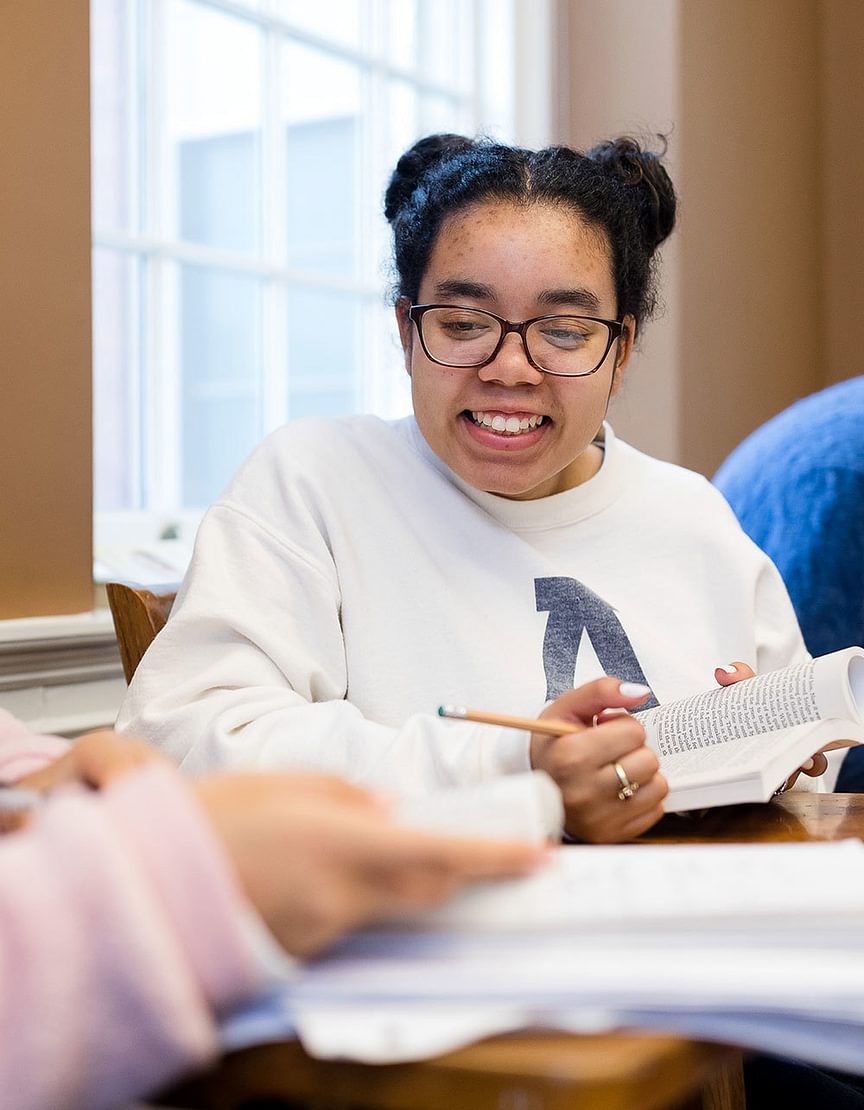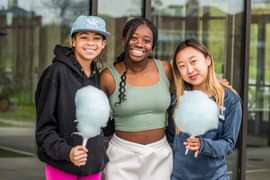
November 20, 2017
Bringing a hybrid fiction workshop to young women
Recently we sat down with Tang Fellow Kate McQuade to discuss her vision for her new Summer Session courseby Jenny Barker
Tang Fellow Kate McQuade, a renowned author and an instructor in English at Phillips Academy, is working this year at the Tang Institute to launch a new, five-week Summer Session course in 2018, titled "A Voice of Her Own: Fiction Workshop for Young Women." Applications are open now to high-school aged girls who are "passionate and excited about pushing the boundaries of what fiction can do." Students are accepted on a rolling basis and space is limited. Below McQuade discusses the course, what she hopes students will experience, and why she is specifically honing in on a hybrid format and young women.
What is the concept?

The theme of this course is literary risk-taking—that is, pushing the boundaries of what fiction can do—and the idea came out of my current Andover elective in creative nonfiction. In that course, which I’ve taught for a number of years, I often ask students to “break the rules” of what they think a personal essay should look like. I want them to recognize, often for the first time, the assumptions they have about how narrative works, then see what happens when they push against those assumptions. Do we have to tell stories in chronological order, for instance? Should an essay always have a unified voice, or does something interesting happen when you braid several dissimilar voices or themes together? What happens to a nonfiction narrative, a “true story,” if the writer uses the tools of poetry or fiction to tell it? Can using those tools actually help the writer discover new stories to tell? I think this sort of rule-breaking approach has been one reason the work that students produce in this course is routinely inspiring, often publishable, and probably more groundbreaking than many of the writers even realize. Rule-breaking begets originality.
Why a course for young women?
A year or two ago, I asked students in a couple of my English classes to send me their favorite poem of all time. It was a totally open-ended assignment, and I didn’t have an agenda for asking them other than pure curiosity; I was getting ready to rework an upcoming poetry unit and I wanted to know where their interests were.
What startled me is that out of the twenty-seven poems I received, which I made into a packet for my students, only three poems were written by women (and only one of those was a poet anyone beyond the student would have heard of). That seemed so statistically improbable, so shocking to me. But I was even more surprised when none of my students noticed the gender imbalance until I pointed it out. I got to thinking about what kind of message my students had received about poetry that made them more likely to choose male poets as favorites, and less likely to notice the gender imbalance. Obviously, this is partly a problem of history; for many centuries, published poets tended to be male poets, and those poets tend to be the ones we teach now in schools. But that historical interpretation doesn’t change the fact that students receive a certain kind of message when they see that “favorite poems” are generally male poems. That’s a problematic message, I think, for all students, but especially for young female writers.
So how can we counter it? First, I think, by acknowledging that gender imbalances persist even today in the publishing world, a problem that wonderful organizations like VIDA are studying. And second, by not assuming that fixing this problem is the sole responsibility of publishers. I think the onus is also on teachers to create spaces where young female writers feel emboldened to take risks, to question assumptions, to offer their ideas without preemptive apology—in short, to have a voice that is valued. I hope that students in this class feel free to do all of those things.
Why a hybrid format?
I’ve taken a lot of writing workshops in my life, and one thing I think workshops do really well is set up temporary supports that force the writer to get work down on paper. Writing is hard; even if you love doing it, writing is often frustrating and lonely, and a workshop course can counter those difficulties by building in deadlines that force the writer to finish things, and by building in a community that offers positive support. What happens, though, when the course ends and those supports fall away?
My hope is that the hybrid structure of this course will offer students both the support of a residential workshop and the practical skills of a writer who is able to write and edit independently, even after the course ends. We will spend time developing skills that focus on expansion (how do you take a little piece of something and make it bigger?), self-editing (how do you identify which parts of a story are working and which aren’t?), and communicating both in-person and electronically with peer editors (recognizing that both forms of communication are crucial to professional writers). I also hope that students will leave this course with a number of new writing and editing skills and with sustainable writing habits that will help them continue to grow as writers even well after the course is finished.
What will a student's day look like?
We will be on campus for the first two weeks of the course. We’ll start each day with in-class activities—sometimes generative writing activities in our classroom, sometimes explorations around campus (in the art gallery, for instance, or on a hike in the bird sanctuary), sometimes collaborative activities and sometimes individual exercises that lead to collaborative discussions. After lunch, we’ll participate in a daily workshop, alternating between full-class workshops and more intimate groups and student-teacher conferences. At the end of the school day, all students will get to participate in the wide range of extracurricular programming that the broader Summer Session program at Andover has to offer—afternoon athletics and club activities, evening dorm gatherings, and field trips off-campus to local colleges, recreational parks, and shops. Most writing assignments during the on-campus portion of the course will be generative assignments, meant to help the writer develop new tools for starting stories, and aimed at ensuring each writer goes home with a number of unfinished “beginnings,” any of which they might expand in the online portion of the course.
During the last three weeks of the course, when students will participate from home via an online platform, most of the writing activities will be focused on expansion. Students will continue to read and discuss models, workshop in small groups, submit story drafts, and benefit from peer and instructor feedback. By the end of the course, students will have at least two fully polished stories ready to share with a broader community or submit to publications if they wish, along with a wide range of in-progress “beginnings” that they can continue to develop on their own.
What will students take away?
More than anything else, I hope students will leave this course with greater confidence in their own writing. That doesn’t mean I want their confidence to be empty, that this is a course where the only thing on offer is warm and fuzzy praise. This is a course where writers are respected, and respect means helping students identify what is and isn’t working in their writing. Students need to recognize both their current strengths and their current weaknesses, the areas in which they still need to grow as writers. Because that’s what being a real writer is—recognizing that there is always room to grow, always the next step to climb. No one ever masters writing. But it is possible to master certain techniques and skills, certain tools that will help the writer get to that next step and not feel lost or overwhelmed. So I hope that when a student leaves this course, “confidence” means she is better able to both recognize that next step and climb it.
About Kate McQuade
Kate McQuade lives in Andover, Massachusetts. Her first novel, Two Harbors, was published by Harcourt under the name Kate Benson, and her short fiction and poetry have appeared in Black Warrior Review, Harvard Review, Baltimore Review, and Verse Daily, among other journals. She was named a 2017 Tennessee Williams Scholar at the Sewanee Writers' Conference and is the recipient of awards and fellowships from Yaddo, the MacDowell Colony, the Ucross Foundation, the Virginia Center for the Creative Arts, the National Foundation for Advancement in the Arts, and the White House Commission on Presidential Scholars. A native Minnesotan, she holds degrees from Princeton University and the Bread Loaf School of English and teaches at Phillips Academy, Andover, where she holds the Harkness Instructorship in English. For more information, visit her website. Photo Credit: Sarah Jordan Photography




